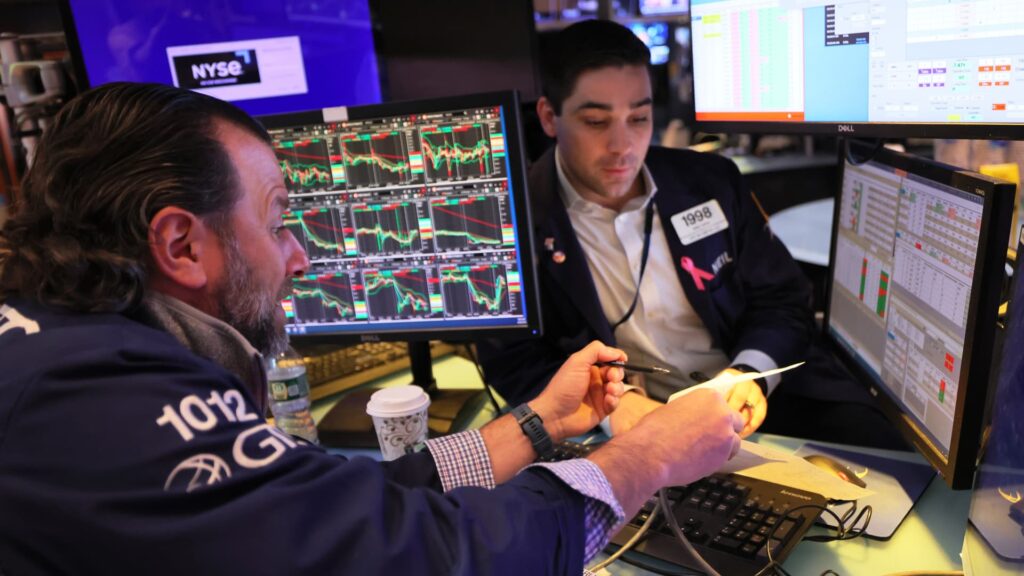Dow drops, Netflix beats estimates, Nvidia rebounds

Traders work on the floor of the New York Stock Exchange during morning trading on Jan. 31, 2024 in New York City.
Michael M. Santiago | Getty Images
This report is from today’s CNBC Daily Open, our international markets newsletter. CNBC Daily Open brings investors up to speed on everything they need to know, no matter where they are. Like what you see? You can subscribe here.
What you need to know today
Broad sell-off
The Dow Jones Industrial Average dropped more than 500 points as investors trimmed positions in technology stocks and booked profits in other sectors. The S&P 500 and the Nasdaq Composite also declined, with Alphabet and Apple among the Big Tech names that fell on Thursday. Even the small cap-focused Russell 2000, up 3.5% in the last five trading days on hopes of interest rate cuts, lost 1.9%. The yield on the 10-year Treasury climbed, while U.S. oil prices inched lower.
Netflix beats
Netflix’s second-quarter earnings beat estimates as it solidified its dominance in the streaming market. The company saw a 34% growth in ad-supported memberships and a 16.5% increase in global paid memberships to 278 million in the reported quarter. This growth, coupled with a crackdown on password sharing, boosted revenue by 17% to $9.6 billion. Netflix raised its full-year revenue growth forecast to 14%-15% from 13% to 15%. Net income rose to $2.15 billion, or $4.88 a share.
Nvidia rebounds
Nvidia shares rose 3% on Thursday, recovering from a 7% drop in the previous session as Donald Trump’s comments on Taiwan raised geopolitical concerns. Nvidia’s rise came after TSMC said demand remained high while supply was constrained for high-end AI chips, which TSMC manufactures for Nvidia. The semiconductor sector had its worst day since 2020 on Wednesday, with AMD, Arm, Broadcom, and Qualcomm also declining. “While there is rising concern over geopolitical tension given the upcoming US presidential election, TSMC mentioned that it would continue its overseas expansion to mitigate the risks,” Citi analyst Laura Chen wrote in a note on Thursday.
Online sale record
Amazon’s Prime Day generated a record $14.2 billion in U.S. online spending, an 11% increase year on year, according to Adobe Analytics. Back-to-school shopping and consumer demand for new electronics drove the surge, contrasting with last year’s inflation-weary shoppers’ focus on household essentials. Amazon highlighted the role of its AI shopping assistant, Rufus, in facilitating customer browsing.
Asia markets slide
Markets in the Asia-Pacific region tracked Wall Street losses amid rising trade tensions. Japan’s Nikkei 225 slipped 0.4% after June inflation came in at 2.8%, unchanged from May. Hong Kong’s Hang Seng index dropped over 2% as energy stocks declined, while mainland China’s CSI 300 inched up 0.1%. South Korea’s Kospi and the Taiwan Weighted Index extended losses, with heavyweights Taiwan Semiconductor Manufacturing Company and Samsung Electronics falling 3.5% and nearly 3%, respectively. Australia’s S&P/ASX 200 dropped 0.81%.
[PRO] Rising trade tensions
Tensions between the U.S. and its trading partners are rising as the Biden administration considers restricting chipmaking equipment exports to China and former president Donald Trump proposes tariffs on all imports if re-elected. These stocks will be the winners and losers of rising U.S.-China trade tensions, Wall Street says.
The bottom line
What does the semiconductor rout tell us? The PHLX Semiconductor Sector Index, which tumbled 6.8% on Wednesday amid concerns about tighter export regulations and Trump’s remarks on Taiwan, just managed a modest recovery of 0.5% on Thursday.
“We understand the rotation away from AI/data-center semis towards industrial/auto/consumer, but it’s not supported by fundamentals and is likely short-term positioning driven,” Bank of America analyst Vivek Arya said in a note Wednesday.
Despite the recent sell-off, Arya remains bullish on the sector, particularly on AI, which he sees as the strongest and most dependable area of capital expenditures. Outside of AI, “global growth remains murky at best,” he added, pointing to consumer restraints on the PC/smartphone upgrade cycle, sluggish enterprise and telco demand, as well as weak demand in China.
Concerns, however, have been building around artificial intelligence and its ability to turn huge capital expenditure into profits amid the lack of killer AI end uses. Microsoft-backed OpenAI launched GPT-4o mini Thursday, a smaller version of its flagship AI model. The $80 billion company is under pressure to maintain market leadership and monetize its technology in the face of growing competition.
Alger CEO Dan Chung told CNBC that the recent volatility in chip stocks is creating a “buying opportunity.”
“These are politically sensitive companies for a good reason because they are the most vital part of the semiconductor industry, ASML in particular is unique,” he said on Wednesday.
“They have already given up quite a bit of revenue because of the restrictions and exports to China. I think the political football will continue around this. We have more trade with than we don’t have with China. We have more trade with our partners around the world, even as we argue about political ramifications… this noise is creating a buying opportunity, or will potentially create one pretty soon.”
Nvidia’s rebound from heavy losses after TSMC said explosive demand for AI has stretched chip supplies, supports Chung and Arya. Broadcom, another chip maker seen as a huge beneficiary from AI demand, also rose 2.9%.
However, markets had another rough session on Thursday. There could be many more to come. Evercore ISI’s head of technical analysis, Rich Ross, in a note to investors warned of potential short-term weakness in the stock market due to historically weak performance in the coming months. Despite this, Ross maintains his bullish outlook for the S&P 500 with a year-end target of 5,800.
— CNBC’s Michelle Fox, Annie Palmer, Hayden Field, Pia Singh, Alex Harring, Sarah Min, Kif Leswing, Lillian Rizzo, Lim Hui Jie and Weizhen Tan contributed to this report.
#Dow #drops #Netflix #beats #estimates #Nvidia #rebounds
News plays a pivotal role in our lives by keeping us informed and connected to the world. It serves as a critical source of information, offering updates on current events, politics, economics, science, and more. Through news, we gain awareness of global issues and local developments, helping us make informed decisions in our personal and professional lives. News also fosters discussion and debate, encouraging critical thinking and perspective-taking. Moreover, it promotes transparency and accountability among governments, businesses, and other institutions. In a rapidly changing world, staying updated with the news enables us to adapt to new challenges and opportunities, shaping our understanding of the complexities of society. Ultimately, news is not just about information; it empowers us to participate actively in the world around us, contributing to a more informed, engaged, and responsible global citizenry.
Health is fundamental to our well-being and quality of life, making it an essential aspect of daily existence. It encompasses physical, mental, and emotional aspects, influencing our ability to function effectively and enjoy life fully. Prioritizing health allows individuals to maintain optimal physical fitness, reducing the risk of diseases and promoting longevity. Mental health, equally crucial, affects our cognitive abilities, emotional stability, and overall happiness. Investing in preventive healthcare through exercise, balanced nutrition, and regular medical check-ups helps in early detection of potential health issues, ensuring timely intervention and treatment. Beyond individual benefits, a population’s health impacts societal productivity and economic stability. Governments and organizations worldwide emphasize public health initiatives to address pandemics, health disparities, and promote overall well-being. Ultimately, health serves as the foundation upon which we build our lives, influencing our ability to pursue goals, nurture relationships, and contribute meaningfully to society.
Money plays a crucial role in our lives as a means of financial security and freedom. It enables us to meet basic needs such as food, shelter, and healthcare, while also providing opportunities for education, travel, and personal growth. Beyond material comforts, money facilitates social connections and experiences that enrich our lives. It empowers individuals to invest in their futures, whether through savings, investments, or entrepreneurial ventures, thereby fostering economic stability and growth. However, the pursuit of wealth should also be balanced with ethical considerations, as money can influence relationships and societal dynamics. Responsible management of finances is key to achieving long-term goals and mitigating financial stress. Ultimately, while money is a tool for achieving aspirations and fulfilling desires, its true value lies in how it is utilized to improve both personal well-being and the broader community.
Earning Easy Money in 2024: Opportunities and Considerations 💸
In 2024, the landscape of earning easy money presents diverse opportunities, albeit with considerations. The digital age offers platforms for freelancing, online trading, and e-commerce, allowing individuals to leverage skills and creativity for financial gain. Cryptocurrency investments continue to allure with potential for quick profits, yet they entail high volatility and risk. Moreover, the rise of the gig economy enables flexible work arrangements through apps and websites, offering quick payouts but often without job security or benefits. Passive income streams such as rental properties and investments in stocks or bonds remain viable, but demand initial capital and ongoing management. Amid these options, caution is essential to avoid scams and unsustainable ventures promising overnight success. Ultimately, while the allure of easy money persists, informed decisions, diligence, and a long-term perspective are crucial for sustainable financial growth and security in the dynamic year ahead.





